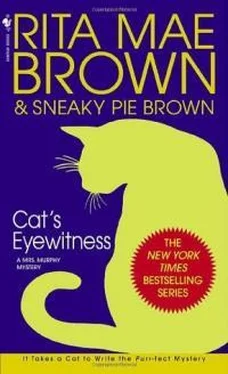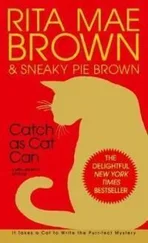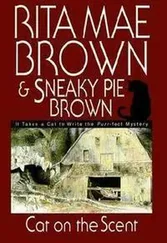"Do you regret not having children?"
"When I see you with your children, I do. When I see other people with those little consumer parasites, no." Harry laughed.
"What do we do now?"
"I don't know. I guess we grow old disgracefully."
"I don't want to grow old. I don't even want to turn forty." Susan tried to sound funny, but she meant it down to her bones.
"You know, Susan, it's funny, but I don't give a rat's ass. It's not the age thing, it's exactly what you said: I don't have a purpose. And I didn't take money seriously, which I truly believe is a woman's fault. We aren't raised to be responsible that way. We're raised to take care of other people, not the pocketbook."
"Lot of truth to that."
They drank their coffee, sat quietly, and then Harry said, "Since we found Great-Uncle Thomas, I've been reading about the Carmelite order on which the Afton monastery is modeled. Back in the seventeenth and eighteenth centuries, people, including the Carmelites themselves, believed in a mythology about the order. They believed that the sons of the prophets, the Old Testament prophets, belonged to the Essenes one thousand years before Christ. They lived on Mt. Carmel. One thousand years later, some of these holy men were present at St. Peter's first sermon on Pentecost. He converted them to Christianity and they built a chapel on Mt. Carmel in honor of the Blessed Virgin Mary.
"According to the myth, the Virgin Mary and the Apostles enrolled in the order.
"Clearly this is all made up, but that didn't prevent people from believing it. Over the centuries the order would relax, then suffer a cleaning paroxysm. Discipline would be restored. But throughout, many believed the story about Mary. My point is twofold." She smiled. "Do I sound like a lawyer?"
"More like a professor."
"Ah, well, anyway, here's where I'm going: this order has a long and rich history, and the Blessed Virgin Mary is at the center of it. My other thought is, what do we believe now that is as patently false as the stories about the Essenes, the sons of the prophets, Mary, and the Apostles? That's where we're coming a cropper, see? We can't see what's real. We literally can't see what's in front of our eyes."
"As in your life and my life?"
"Right."
"As in my great-uncle Thomas and Nordy Elliott meeting their Maker?"
"Right. It's in front of our eyes, but our belief system is so strong, we are so invested in it, that we can't see."
"I see," Susan replied, then had to laugh. "I mean, I get your point but I don't see. Not yet."
"Another thing. I didn't tell you. I didn't tell anyone if that will make you feel better. You've been worried. Crazy things are happening all around us."
"And?"
"Fair has given me until Christmas Eve to answer with a yes or no concerning his often-repeated marriage proposal." She stared down at the coffee cup.
Susan straightened in the chair. "That is news!"
32
A cavern of snow faced Harry, Mrs. Murphy, Pewter, and Tucker at the soapstone quarry in the northeastern corner of Nelson County. The quarry was so deep that snow in the bottom didn't completely melt until the end of April. In the mid-eighteenth century the quarry brought prosperity to the small community of Schuyler. Like everything else in Virginia, the profits disappeared after 1865. Two generations after the war, the quarry boomed. Its fortunes shot upward and plunged down many times over the twentieth century. Despite the varying demand for soapstone and other types of stone, the quality of the product remained what it had always been: high.
"Imagine digging stone with pickaxes," Iggy Monroe said as he walked alongside Harry, the animals, and Bo Newell, who had introduced her to Iggy "Before white men, the Indians didn't even have iron picks and shovels. Harder work for them." His beat-up work boots sank into the snow as he led Harry to the main road down into the open mines. "This stone is so special because it makes the best wood-burning stoves in the world. Perfect material."
"It conducts heat," Bo added. "Evenly."
"This grade of soapstone conducts it in an even manner without cracking," Iggy added. "You don't get the exterior heat that an iron stove throws off. An iron stove can turn red-hot on you. Not going to happen with this."
"You can carve it?" Harry inquired.
"Yeah, better in slabs, though."
"But you can carve it into statues and stuff, you can cut into it to make signs?"
"Kind of a waste. If you want to make signs, use slate."
"Isn't soapstone a little oily?" Bo inquired.
"Yes."
"Could it leak liquid?"
"No, not if the stove is properly built."
"I'm not being very clear. When I mean, Mr. Monroe, is, if there were a vein of iron ore inside the stone, might the stone ooze iron ore—you know, a rusty liquid coming out of a crack?"
He shook his head. "No. There's no iron ore in this. We'd have hit a seam by now, and you can see"—he swept his hand toward the cavern—"there haven't been any iron seams for over two hundred and fifty years."
"Would it be possible to drill up through the stone and run liquid through it?"
"Sure, but you can do that with most any stone, even marble, which is dense and tight. The soapstone isn't a good candidate for that."
After chatting a few more minutes with Mr. Monroe and saying good-bye to Bo, Harry and the animals returned to her truck. As she drove the winding asphalt road back toward Route 29, she turned on the old radio, frowned at the static, then clicked it off.
"Babies, someone has worked on the statue of Our Blessed Virgin Mother. There's not one doubt in my mind. And whoever did it was smart. They knew enough to bury their little line beneath the frost line." She thought longer. "It'll freeze above the frost line when it's bitterly cold. Hmm."
"If someone planned a miracle, you can bet they considered that and figured it out, too," Tucker sagely noted.
"If she's right. It's still possible this is a miracle." Pewter sat next to the dog. "Not that I think it is, but you need an argument."
"Can't believe you admit being contentious." Mrs. Murphy was jubilant.
"I admit a lot of things." Pewter slightly tossed her head, then laughed. "On rare occasions."
Harry had the bit between her teeth. "Heat tape? Oh, that would take too much room. Could someone keep a pipe warm off a battery? Wonder if there's another way to create tears without drilling up through Mary." She absentmindedly reached for Mrs. Murphy, sitting closest to her. "And how could someone work on that statue without being detected? If my idea is right, drilling up through her, that would take time. How would someone get away with it? And it would have to be done in the summer. Damn."
"She's about to go into a tizzy." Pewter listened to the note of frustration in Harry's alto voice.
"If she's right, about the drilling, it points in one direction, doesn't it?" Mrs. Murphy didn't like the direction.
"Brother Thomas." Harry said what Mrs. Murphy was thinking. "It's not possible. Why would he do something like that? I can't believe it." She exhaled a blast of air from her nostrils.
Unable to contain herself, she drove to Susan's just as Susan was coming out her driveway. She stopped as Harry pulled alongside her, pressing a button. The automatic window whined as it slid down.
Harry rolled down her window.
"Harry, I'm going up to Afton."
"Why?"
"The report just came in from the lab in Richmond. My g-uncle had traces of chloroform in his body and," she paused, her anger rising, her voice trembling, "morphine. He was killed with an overdose of morphine."
"Oh, Susan." Harry's eyes widened. "But wait. Wait. Don't go up there, Susan. Not yet. It's not safe. Come on, turn around, let me tell you what I've dug up"—she didn't think about that being a pun—"and we can formulate a plan."
Читать дальше












